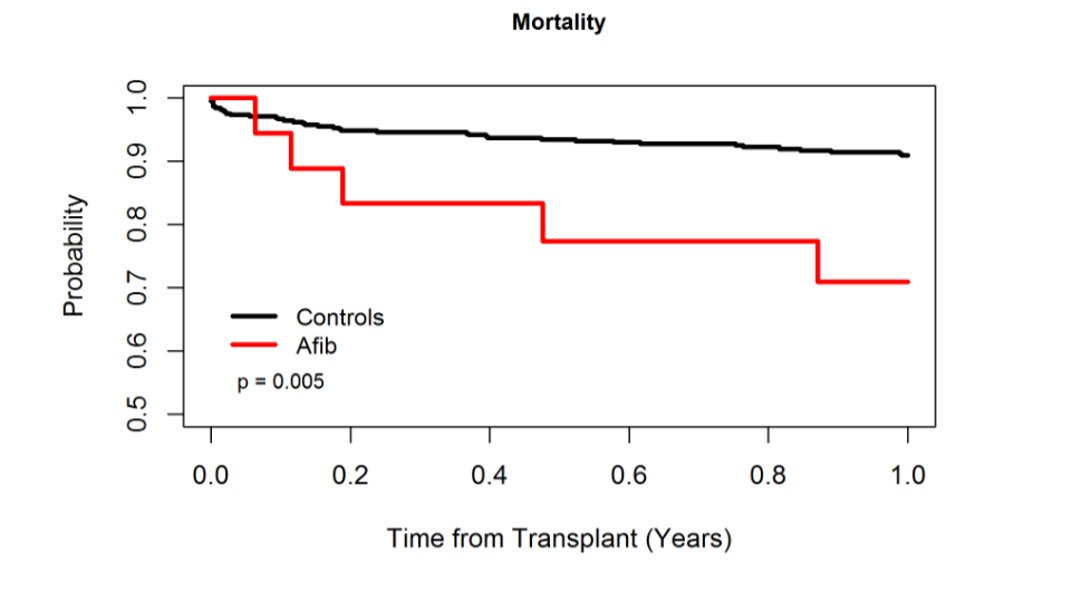Impact of New Onset Atrial Fibrillation on Clinical Outcomes in Liver Transplant Recipients
1Gastroenterology, Hepatology and Nutrition, University of Minnesota Medical Center, Minneapolis, MN, 2Fairview Health Services., Minneapolis, MN, 3Transplant Surgery, University of Minnesota Medical Center, Minneapolis, MN
Meeting: 2020 American Transplant Congress
Abstract number: A-160
Keywords: Liver transplantation, Outcome, Survival
Session Information
Session Name: Poster Session A: Liver Retransplantation and Other Complications
Session Type: Poster Session
Date: Saturday, May 30, 2020
Session Time: 3:15pm-4:00pm
 Presentation Time: 3:30pm-4:00pm
Presentation Time: 3:30pm-4:00pm
Location: Virtual
*Purpose: Atrial fibrillation (AF) is a common arrhythmia in liver transplant (LT) recipients but there continues to be a paucity of data on this topic. We evaluated the relationship between new onset AF and clinical outcomes in LT recipients in addition to describing precipitants and management at our center.
*Methods: We performed a single-center, retrospective analysis of LT recipients from June 2011 to October 2019. We compared clinical outcomes of patients who developed AF within first 30 days after LT to patients without AF. Patients with pre-existing AF were excluded from analysis. Primary outcome was overall survival. Secondary outcomes included graft survival, acute cellular rejection (ACR), hospital length of stay (LOS) and ICU LOS. Graft-, patient- and ACR-free survival (censored at one year) were analyzed using the Kaplan-Meier survival method
*Results: 470 patients underwent LT during the study period – 69.1% patients were male, mean MELD-Na at LT was 30.79 and 20.4% had alcoholic liver disease. 18 patients (3.8%) developed AF within 30 days of LT- mean age at LT was 61.77 years (vs 55.64, p= 0.02). 1-year overall survival was lower in LT recipients with AF (see figure, p= 0.005). No differences were seen for graft survival or ACR at 1 year. Hospital LOS and ICU LOS were longer in LT recipients with AF (37.7 days vs 15.6 days, p<0.001, and 11 days vs 5.7 days, p= 0.02, respectively). Hypovolemia or hemorrhage was the precipitant of AF in 50% of cases. 13 patients (81%) with AF were managed with rate control with only 1 patient requiring direct current cardioversion (DCCV).
*Conclusions: New onset AF is associated with worse clinical outcomes in LT recipients. Optimization of risk stratification strategies to identify patients at risk of developing AF may improve survival and reduce costs in LT recipients. Further studies are also needed to determine the optimal management of AF in this population.
To cite this abstract in AMA style:
Anugwom CM, Jackson S, Pruett T, Lim N. Impact of New Onset Atrial Fibrillation on Clinical Outcomes in Liver Transplant Recipients [abstract]. Am J Transplant. 2020; 20 (suppl 3). https://atcmeetingabstracts.com/abstract/impact-of-new-onset-atrial-fibrillation-on-clinical-outcomes-in-liver-transplant-recipients/. Accessed February 5, 2026.« Back to 2020 American Transplant Congress

